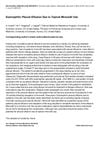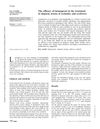 16 citations,
June 2019 in “International Journal of Women's Dermatology”
16 citations,
June 2019 in “International Journal of Women's Dermatology” Type 2 diabetes may increase the risk of severe hair loss in African American women.
 14 citations,
January 2019 in “Skin appendage disorders”
14 citations,
January 2019 in “Skin appendage disorders” PFS might be a delusional disorder with potential to become mass psychogenic illness.
 12 citations,
July 2019 in “Acta Neurologica Belgica”
12 citations,
July 2019 in “Acta Neurologica Belgica” Levodopa for Parkinson's disease might be linked to skin issues like melanoma, but it's unclear if the drug or the disease causes them.
 8 citations,
August 2015 in “European Journal of Clinical Pharmacology”
8 citations,
August 2015 in “European Journal of Clinical Pharmacology” Rivaroxaban may cause hair loss.
 7 citations,
July 2011 in “Survey of Ophthalmology”
7 citations,
July 2011 in “Survey of Ophthalmology” The document concludes that periocular hair disorders have various causes and treatments, and proper evaluation by specialists is important for management and prognosis.
 6 citations,
January 2012 in “Annals of Indian Academy of Neurology”
6 citations,
January 2012 in “Annals of Indian Academy of Neurology” Women with epilepsy on certain medications might gain weight and have higher thyroid-stimulating hormone levels, but not more polycystic ovarian syndrome.
 5 citations,
October 2022 in “Heliyon”
5 citations,
October 2022 in “Heliyon” Polycystic ovary syndrome, a disorder causing menstrual issues and infertility, can be treated with lifestyle changes, medication, herbal remedies, surgery, and assisted reproductive techniques like artificial insemination and IVF.
 4 citations,
January 2011 in “International Journal of Trichology”
4 citations,
January 2011 in “International Journal of Trichology” Accidental findings have led to new hair treatment discoveries, like using blood pressure and diabetes medications for hair loss and unwanted hair.
 3 citations,
August 2022 in “JAAD case reports”
3 citations,
August 2022 in “JAAD case reports” A woman developed swelling in her body after taking low-dose oral minoxidil for hair loss, but it resolved after stopping the medication.
 3 citations,
April 2010 in “Endocrinology”
3 citations,
April 2010 in “Endocrinology” The mouse model suggests male pattern baldness may be due to an enzyme increasing DHT and higher androgen receptor levels in hair follicles.
 2 citations,
May 2022 in “JAAD Case Reports”
2 citations,
May 2022 in “JAAD Case Reports” A woman lost all her hair after mild COVID-19, but it started to regrow after treatment with a specific medication.

A woman's use of minoxidil for hair loss caused fluid buildup in her chest, which went away when she stopped using the product.
 1 citations,
March 2023 in “Nutrients”
1 citations,
March 2023 in “Nutrients” The conclusion is that obesity should be managed with a slow, balanced approach to diet and exercise, with medication and surgery as additional options, and education and access to care are important.
 1 citations,
July 2017 in “The Journal of Urology”
1 citations,
July 2017 in “The Journal of Urology” Low-dose finasteride and dutasteride reduce PSA levels by 27.8% in men with male androgenetic alopecia.
 1 citations,
August 2015 in “Current Sexual Health Reports”
1 citations,
August 2015 in “Current Sexual Health Reports” 5α-reductase inhibitors can cause serious and possibly lasting sexual and psychological side effects.
 1 citations,
July 2015 in “The European research journal”
1 citations,
July 2015 in “The European research journal” Stopping aripiprazole can reverse its side effect of hair loss.
 March 2023 in “Cellular Molecular and Biomedical Reports”
March 2023 in “Cellular Molecular and Biomedical Reports” The study found that heart disease is common in people with PCOS and that being overweight is a major risk factor; lifestyle changes and medication are important for management.
 December 2022 in “International Journal of Current Science Research and Review”
December 2022 in “International Journal of Current Science Research and Review” Polycystic Ovary Syndrome (PCOS) is a common but often undiagnosed disorder in women that can cause irregular periods, infertility, and other symptoms, and can be managed with lifestyle changes, medication, and sometimes surgery.

Lamivudine might reverse hair graying and needs more research for potential treatments.
 January 2018 in “Elsevier eBooks”
January 2018 in “Elsevier eBooks” Minoxidil helps lower severe blood pressure and promotes hair growth but can have serious side effects and must be used continuously.
June 2015 in “Obstetrics, gynaecology and reproductive medicine” Hirsutism, excessive hair growth in women, is often caused by polycystic ovarian syndrome and is treated by targeting the cause, lifestyle changes, and medication.
 212 citations,
September 2008 in “Journal of The American Academy of Dermatology”
212 citations,
September 2008 in “Journal of The American Academy of Dermatology” Minoxidil and finasteride treat hair loss in men, while minoxidil treats hair loss in women.
 54 citations,
September 2019 in “Journal of the European Academy of Dermatology and Venereology”
54 citations,
September 2019 in “Journal of the European Academy of Dermatology and Venereology” Tofacitinib is somewhat effective for alopecia areata, but more research is needed on its safety and long-term effects.
 40 citations,
December 2016 in “Journal of Ovarian Research”
40 citations,
December 2016 in “Journal of Ovarian Research” Rutin may help treat symptoms of polycystic ovary syndrome (PCOS) in rats.
 36 citations,
November 2020 in “Journal of The European Academy of Dermatology and Venereology”
36 citations,
November 2020 in “Journal of The European Academy of Dermatology and Venereology” 5-alpha-reductase inhibitors may reduce COVID-19 symptoms in bald males.
 25 citations,
March 2012 in “Journal of oncology pharmacy practice”
25 citations,
March 2012 in “Journal of oncology pharmacy practice” An 81-year-old man's white hair began to regain its original color while he was treated with lenalidomide, suggesting that graying hair might be reversible.
 21 citations,
July 2018 in “The Journal of Sexual Medicine”
21 citations,
July 2018 in “The Journal of Sexual Medicine” The 2018 update to the ED care model added a new severity score and stressed a detailed evaluation of both physical and psychological aspects.
 20 citations,
November 2009 in “European Journal of Dermatology”
20 citations,
November 2009 in “European Journal of Dermatology” Latanoprost, a glaucoma treatment, was found ineffective in treating hair loss in eyebrows and eyelashes.
 14 citations,
May 2013 in “Emerging infectious diseases”
14 citations,
May 2013 in “Emerging infectious diseases” Cryptococcus gattii can remain dormant in animals for over 8 years.
 7 citations,
June 2020 in “Translational Andrology and Urology”
7 citations,
June 2020 in “Translational Andrology and Urology” Finasteride for hair loss may cause lasting sexual, genitourinary, mental, and anti-androgenic side effects in young men.





























